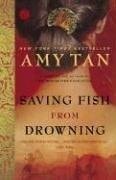
Amy Tan, who has an unerring eye for relationships between mothers and daughters, especially Chinese-American, has departed from her well-known genre in Saving Fish From Drowning. She would be well advised to revisit that theme which she writes about so well. The title of the book is derived from the practice of Myanmar fishermen who "scoop up the fish and bring them to shore. They say they are saving the fish from drowning. Unfortunately... the fish do not recover," This kind of magical thinking or hypocrisy or mystical attitude or sheer stupidity is a fair metaphor for the entire book. It may be read as a satire, a political statement, a picaresque tale with several "picaros" or simply a story about a tour gone wrong. Bibi Chen, San Francisco socialite and art vendor to the stars, plans to lead a trip for 12 friends: "My friends, those lovers of art, most of them rich, intelligent, and spoiled, would spend a week in China and arrive in Burma on Christmas Day." Unfortunately, Bibi dies, in very strange circumstances, before the tour begins. After wrangling about it, the group decides to go after all. The leader they choose is indecisive and epileptic, a dangerous combo. Bibi goes along as the disembodied voice-over. Once in Myanmar, finally, they are noticed by a group of Karen tribesmen who decide that Rupert, the 15-year-old son of a bamboo grower is, in fact, Younger White Brother, or The Lord of the Nats. He can do card tricks and is carrying a Stephen King paperback. These are adjudged to be signs of his deity and ability to save them from marauding soldiers. The group is "kidnapped," although they think they are setting out for a Christmas Day surprise, and taken deep into the jungle where they languish, develop malaria, learn to eat slimy things and wait to be rescued. Nats are "believed to be the spirits of nature--the lake, the trees, the mountains, the snakes and birds. They were numberless ... They were everywhere, as were bad luck and

